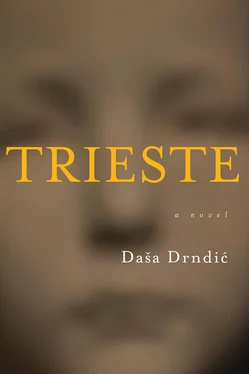Come on, forget those dolls, forget the Borghilds, chuckles S.S.-Gruppenführer Reinhard Heydrich, organizer of the “Night of the Long Knives” and the brain behind the Einsatzgruppen, chairman of the conference at Wannsee, later known as the Butcher of Prague, who at this juncture is head of the S.S. Rasse- und Siedlungshauptamt (R.u.S.H.A.), the race and settlement office, transformed as it was from an unprepossessing institution into a powerful organization wielding authority over a broad network of informants with thousands of dossiers on Communists, unionists, social democrats, on rich industrialists, Jews, even members of their own Nazi Party and S.A. (Sturmabteilung) henchmen. Reinhard Heydrich, the reclusive sadist, accomplished gymnast, skilled fencer, fearless pilot, is raised in high society in a family of musicians and artists. Forget the dolls! exclaims Heydrich. We have genuine, first-class ladies ready to give their all for their homeland! After the war, while in prison, Walther Schellenberg pens his memoirs, which he calls Labyrinth, and in which he asserts that “their” women, who worked at Kitty’s, were qualified and cultivated ladies from the Berlin demi-monde, but that there were others, too, from the cream of German society, women prepared to serve their homeland without reservation. On account of his liver cancer, Schellenberg is released from prison after serving two years of a six-year sentence, and in 1952 he dies in Turin, convinced that he has been one of the most successful spies of all time.
The war is fast approaching. Information leaks now and then, with wine and beautiful women, in the throes of coital passion, all sorts of things slip out. So Reinhard orders Walther: Put pressure on Kitty Schmidt . Kitty Schmidt hands over her famous house of ill repute to the Reichssicherheitshauptamt and signs a secret statement, according to which she will ask no questions and do whatever she is told. She also signs that she understands, should she fail to obey, that they will execute her immediately. And so, although prostitution is expressly banned, or rather strictly forbidden, workmen move into the house at Giesebrechtstrasse 11, following Walther Schellenberg’s orders. A complete refurbishment ensues; a new, more beautiful, luxurious, perfect brothel is built; a high-class whorehouse for V.I.P.s and spies. All the rooms, from the corridors to the boudoirs on the third floor of the building at Giesebrechtstrasse 11 have double walls into which surveillance equipment is installed, and from it hidden cables run down to a bricked-off portion of the cellar where there are five monitoring desks, each with two record turntables and wax discs spinning on them, which means that conversations from ten rooms can be recorded on those wax discs simultaneously.
Then S.D.-Untersturmführer Karl Schwartz sets out to snare personnel. These unprecedented raids on whorehouses, nightclubs and streets corners multiply. Young women are pulled aside and grilled in a rigorous selection process. Doctors, psychiatrists, linguists and university professors all help Schwartz whittle his shortlist of ninety breathtakingly beautiful potential “activists” down to twenty first-class women. Under lock and key for seven weeks in a sealed-off wing of the Sonthofen Officers’ Academy, amid thick forests, small lakes and natural wonders, which they have no chance to appreciate because of the snow, surrounded by fresh air they have no time to enjoy, the beauties spend their nights engaged in a fundamental re-education. After gruelling training in foreign languages, marksmanship and unarmed combat; after instruction in politics and ideology, and courses in international and domestic economics; after the study of secret codes and cyphers, and memorizing countless charts of military insignia, uniforms and decorations, twenty peerless Nikitas of Nazism and counterintelligence are born, o temporal o mores! R.u.S.H.A. finally inserts them into the redecorated Salon Kitty in March 1940, and they write reports after every instance of sexual intercourse, unaware that they, too, are being recorded.
Madame Schmidt receives her final instructions. Carry on as before, Schwartz tells her, or was it Schellenberg, either way. Welcome all your old customers. Keep on your existing girls. But every so often we will send along special guests, might this be Schwartz speaking? On no account are you to introduce them to one of your regular girls. Show them this album of twenty girls, Schwartz, apparently, says. When they choose their lady friend, phone for her. She will arrive in ten minutes. You will not discuss their clients with these girls, and they will leave immediately after the special guest of yours, of ours, has left the building .
How will I know this is a special guest? asks Madame Kitty, because she can barely wait for work to begin again.
Our guests will use the codeword “I come from Rothenburg”, Schwartz says, or was it Schellenberg?
Where is Rothenburg? asks Kitty Schmidt.
Schellenberg immediately reminds Kitty Schmidt of the secret agreement she signed, and Kitty Schmidt no longer asks questions, she just coordinates the work and feigns naïveté. A soldier who is genuinely from Rothenburg shows up once at Salon Kitty He is no special guest, but this soldier receives first-class sexual services with the lady listed in the album as Number 7, and though the soldier from Rothenburg does climax, he gives away no information to anyone, he merely climaxes as he never has; and even after the magnificent orgasm, while he sips champagne, nibbles caviar and whispers foolish promises in the ear of beauty Number 7, he betrays no secrets, because he has none to betray, but the wax discs in the cellar spin, around they spin, recording only moans. Until late 1942 Kitty is visited by various prominent people, domestic and foreign powermongers: Count Galeazzo Ciano, Joachim von Ribbentrop, and their Spanish colleague, Minister of Foreign Affairs Ramón Serrano'Súñer, then S.S.-Major-General Sepp Dietrich, a particularly demanding guest who asks for all twenty girls at once for a party, a huge orgy; the cables on the “bugs” are red hot from his sexual potency and physical stamina. The confidential staff in the cellar are astonished and agitated. The only time the recording and listening equipment is turned off is during Reinhard Heydrich’s regular, in fact, frequent “tours of inspection”. Spies stop in at Salon Kitty, such as Roger Wilson, a British spy who gives his name as Ljubo Kolčev, a staff member at the Bulgarian Embassy. He happens to trip over a surveillance cable while workmen for the secret service are running it from the cellar of Giesebrechtstrasse 11 to the offices of the main staff of the Sicherheitsdienst (S.D.) on Meinekestrasse, in the close vicinity of the building where Nobel Prize winner Imre Kertész happens to live today, a man whose fate was probably tailored by Eichmann in the mid-1940s right there at Meinekestrasse. Upon seeing other things besides sex going on at Salon Kitty, Wilson, the British spy, secretly introduces his own secret British service of counter-espionage. Forget poor Borghild. Those were the days, my friend . In 1940 alone, more than 10,000 men take the stairs up to the third floor of Number 11 on Giesebrechtstrasse in Berlin. In just one month there are more than 3,000 orgasmic sessions recorded. But as time passes there are more and more special guests; they outnumber the ordinary clients, and the “special ladies” work full steam, spending more time at Madame Kitty’s parlour. They drink more, report less, discipline dwindles in the sexual headquarters of counter-intelligence, the Gestapo send in additional quantities of food and drink. This all costs a pretty penny — there’s a war on — and Heydrich’s dissatisfaction grows. In July 1942 a bomb falls on the building on Giesebrecht-strasse, and the Gestapo wash their hands of the operation. The bugging apparatus is hastily removed. Kitty and all the girls, the special girls whose golden carriages have overnight turned to pumpkins, and the ordinary Cinderellas who have been with her for years, set up shop on the ground floor of the building and go on working. Until her death in 1954 Kitty never breathes a word about the entire operation. Twenty-five thousand recorded discs in the Gestapo archive mysteriously disappear after the Russians enter Berlin, and word has it that they end up at Stasi headquarters, and the war waged via cunts proves yet again to be without effect.
Читать дальше












